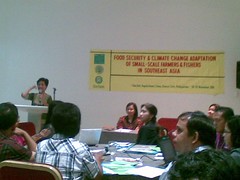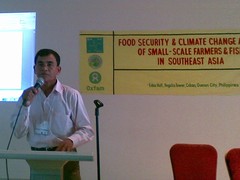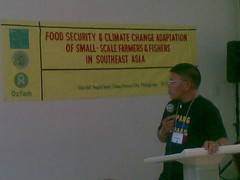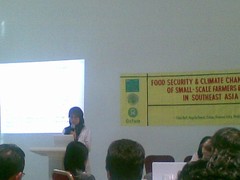A forum-workshop entitled “Food Security and Climate Change Adaptation of Small Scale Farmers and Fishers in Southeast Asia” was held in Quezon City, Philippines, last Nov 24-25. The workshop was co-organized by Oxfam International’s East Asia office, Southeast Asia Fisheries for Justice (SEAFISH), a regional alliance of NGO and fisher groups, and Asian Farmers’ Association for Sustainable Rural Development (AFA), a regional alliance of national farmers organizations.
AFA participants included Oun Sophal and Meas Somica from Farmer and Nature Net (Cambodia), Lutfiyah Hanim from Aliansi Petani Indonesia, Rene Cerilla from PAKISAMA (Philippines),Vicky Serrato and Esther Penunia from the secretariat.
Small scale farmers and fishers are trying to adapt to climate change as much as they can. In this workshop, participants shared various adaptation strategies. Here are some of what they shared:
Oun Sophal, President of Farmer and Nature Net, AFA member in Cambodia:
System of rice intensification, multi-purpose farm, home gardening, use of bio-digester, mobilization and strengthening of mutual help when community members face physical and financial crisis, strengthening of farmers’ capacities in adapting/adopting technical innovations by improving technical knowledge and know-how on improving access to funds through savings and credit activities, thus allowing the community members to increase investment capacity to adapt technical innovations, mobilization of community members for participation in construction of infrastructure such as dams, dikes, canal, reservoir, community ponds.
Rene Cerilla, Advocacy Leader, PAKISAMA, AFA member in the Philippines:
Coconut farmers in the Philippines have been experiencing low or no harvest the past year because of the long drought spell. Because of this, other livelihood activities in communities relying on coconut have been severely affected, such as: harvesting, consolidation, cleaning, piling, including labor during delivery of goods in the market; charcoal making; copra trading; labor using draft animals for hauling; sari-sari (multi-purpose) store, local people producing farm equipment; driver/truck delivery. Adaptation strategies have included multi-layer cropping system (integration of other crops under the coconut tree); farm diversification; use of upland rice and other crops resistant to drought; backyard livestock and free range chicken; growing and consumption of alternatives to rice such as root crops; and engaging in non-farm activities such as paper flower making, making brooms and barbecue sticks from coconut midribs, driving (taxis, tricycles, jeepneys) and cooking and selling local delicacies. Moreover, coconut farmers are urging the government to release the coconut levy funds and use the funds to finance programs for small coconut farmers’ increased productivity and incomes through coconut-based value-added activities.
Lutfiyah Hanim, Adviser, Aliansi Petani Indonesia (API), AFA member in Indonesia:
API conducts training on plant breeding aimed to preserve local varieties and to refresh farmers’ knowledge on plant breeding; seed exchange (e.g. East Java members gave seeds with salt tolerance to Bekasi members), food barns; multi-/mixed cropping/farming (planting Turi in rice fields to reduce erosion and to feed cows and cow dung is used for composting; planting different paddy rice varieties to control pest); system of rice intensification. API’s policy recommendation with their government includes promotion of sustainable agriculture including transition to it; harmonize policies so that everything is in line with the promotion of sustainable agriculture; more adaptation programs in agriculture in developing countries; real and significant cuts in GHG emissions.
Ms. Pourchamarn Wongsanga, from the Agriculture, Industries and Natural Resources Division of the ASEAN secretariat, informed the participants about the ASEAN Framework on Climate Change (AFCC). She said that an Ad Hoc Steering Committee on Climate Change and Food Security has been created to develop a comprehensive strategy and roadmap for the implementation of the AFCC. Ms. Wongsanga acknowledged that they need to engage relevant partners/stakeholders, including farmers, fishers groups and NGOs. She and the co-organizers agreed to explore mechanisms on how we can get involved in the process and the kind of partnerships it may take.







Comments are closed